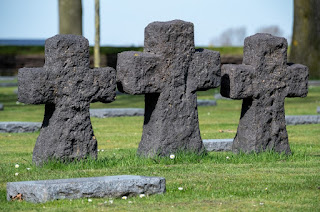 |
| Stones in a German Military Cemetery photo by dendoktoor at https://pixabay.com/photos/cemetery-german-military-cemetery-7949666/ |
This world history resource focuses on World War I (The Great War)
from 1914 to 1918 and includes quiz questions and answers
and video links to related topics.
I utilized World History: Patterns of Interaction (Holt McDougal) for our world history textbook. It has multiple options for different learning styles and covers a wide array of information.
This quiz accompanies Chapter 29: pages 838-863.
Directions for the quiz:
- Scroll down and click on the thumbnail to enlarge to full screen.
- Click on the graphic to advance to the next screen.
- Choose an answer for each question.
- Compare your answers with those provided.
If you are interested in a group and/or interactive version of this quiz,
log in to Kahoot! and search for Week 29 World History by Katrena.
Below are free videos to accompany chapter 29:
- Kaiser Wilhelm II
- Treaties & Alliances Building Up to World War I
- Schlieffen Plan
- 1918 Influenza Pandemic
- Crash Course: How World War I Started
- Crash Course: Post-World War I Recovery
- Crash Course: Women in the 19th Century
Thanks for visiting my Student Survive 2 Thrive blog.
Navigate my blog easily through my site map, topics
tabs on the right, or via my search bar.
Here are a few of my articles you may also find helpful this week:
- Week 29 Visual Arts: Art Deco, Pysanki, Batik
- Week 29 Ninth Grade ELA Assignments
- Infection Prevention Practice Test
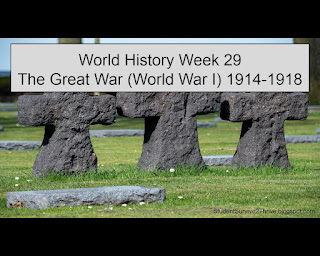 |
| World History Week 29 The Great War (World War I) 1914-1918 |
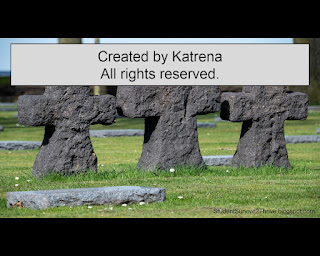 |
| Created by Katrena. All rights reserved. |
 |
| The correct answer is: Austria-Hungary, Germany, Italy, Great Britain, France, Russia |
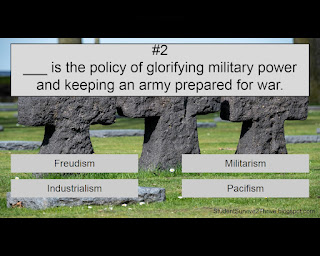 |
| ___ is the policy of glorifying military power and keeping an army prepared for war. Answer choices include: Freudism, Militarism, Industrialism, Pacifism |
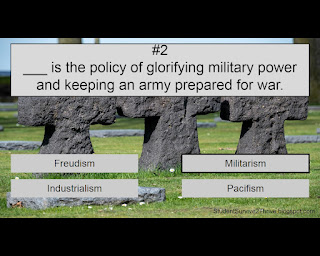 |
| The correct answer is militarism. |
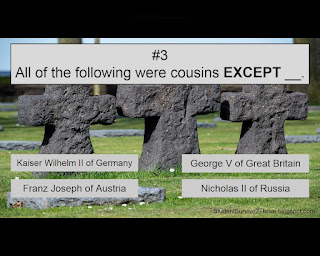 |
| All of the following were cousins EXCEPT __. Answer choices include: Kaiser Wilhelm II of Germany, George V of Great Britain, Franz Joseph of Austria, Nicholas II of Russia |
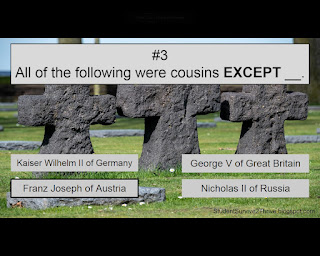 |
| The correct answer is Franz Joseph of Austria. |
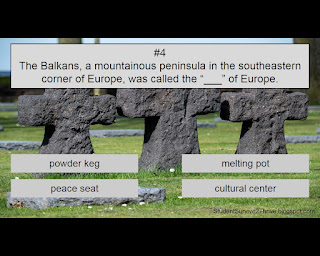 |
| The Balkans, a mountainous peninsula in the southeastern corner of Europe, was called the “___” of Europe. Answer choices include: powder keg, melting pot, peace seat, cultural center |
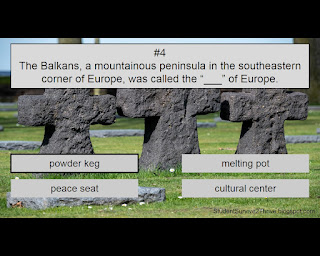 |
| The correct answer is powder keg. |
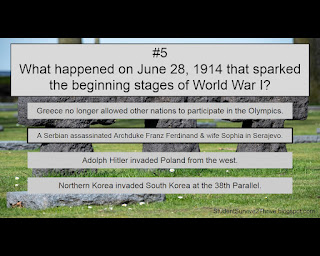 |
| The correct answer is: A Serbian assassinated Archduke Franz Ferdinand & wife Sophia in Serajevo. |
 |
| Machine guns, poison gas, armored tanks, & larger artillery secured land quickly with a minimum loss of life during World War I. Answer choices include: true, false |
 |
| The correct answer is false. |
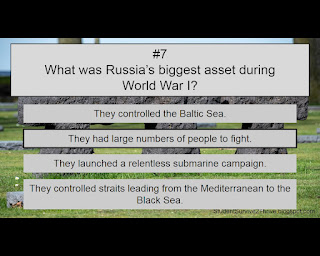 |
| The correct answer is: They had large numbers of people to fight. |
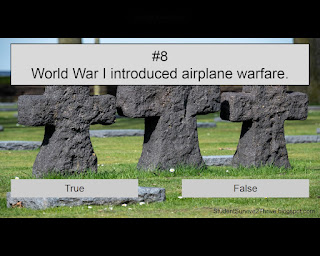 |
| World War I introduced airplane warfare. Answer choices include: true, false |
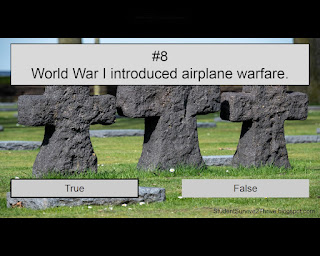 |
| The correct answer is true. |
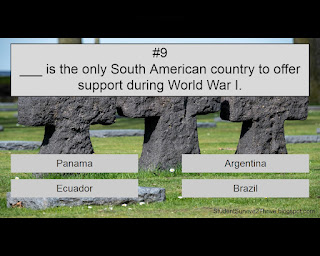 |
| ___ is the only South American country to offer support during World War I. Answer choices include: Panama, Argentina, Ecuador, Brazil |
 |
| The correct answer is Brazil. |
 |
| The correct answer is all of these. |
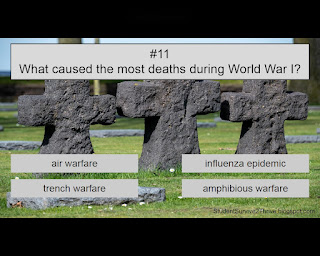 |
| What caused the most deaths during World War I? Answer choices include: air warfare, influenza epidemic, trench warfare, amphibious warfare |
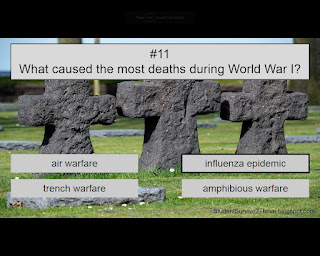 |
| The correct answer is influenza epidemic. |
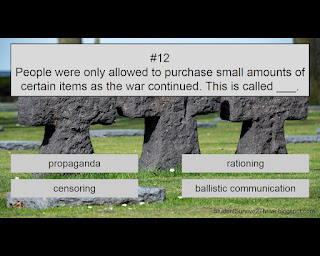 |
| People were only allowed to purchase small amounts of certain items as the war continued. This is called ___. Answer choices include: propaganda, rationing, censoring, ballistic communication |
 |
| The correct answer is rationing. |
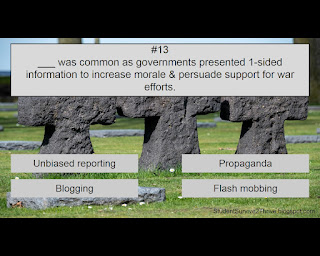 |
| ___ was common as governments presented 1-sided information to increase morale & persuade support for war efforts. Answer choices include: Unbiased reporting, Propaganda, Blogging, Flash mobbing |
 |
| The correct answer is propaganda. |
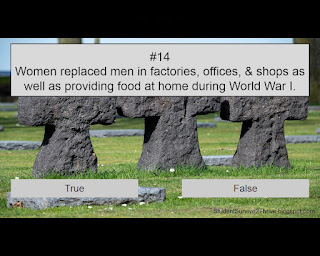 |
| Women replaced men in factories, offices, & shops as well as providing food at home during World War I. Answer choices include: true, false |
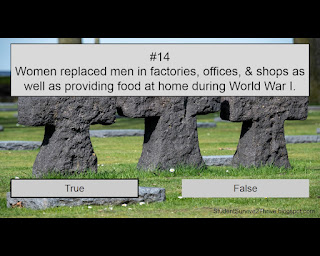 |
| The correct answer is true. |
 |
| After Russia withdrew from the war, upon which country did Germany increase their attacks? Answer choices include: France, Switzerland, the Netherlands, Serbia |
 |
| The correct answer is France. |
 |
| The correct answer is armistice. |
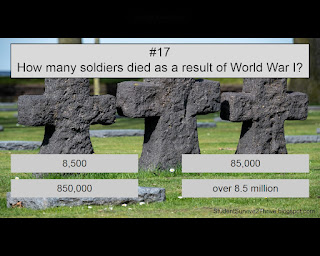 |
| How many soldiers died as a result of World War I? Answer choices include: 8,500; 85,000; 850,000; over 8.5 million |
 |
| The correct answer is over 8.5 million. |
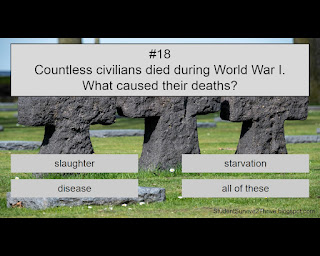 |
| Countless civilians died during World War I. What caused their deaths? Answer options include: slaughter, starvation, disease, all of these |
 |
| The correct answer is all of these. |
 |
| The correct answer is Woodrow Wilson. |
 |
| According to the war-guilt clause in the Treaty of Versailles, which country was responsible for World War I? Answer choices include: Russia, France, Germany, Great Britain |
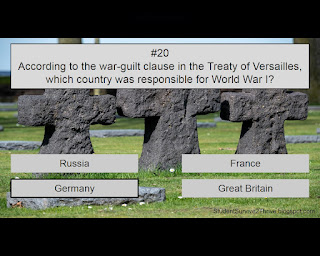 |
| The correct answer is Germany. |
 |
| Find more resources at StudentSurvive2Thrive.blogspot.com |
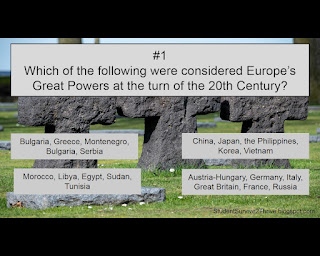

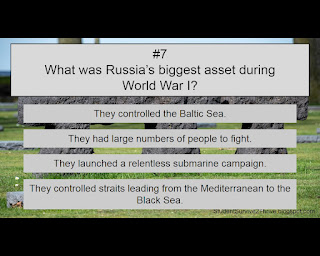
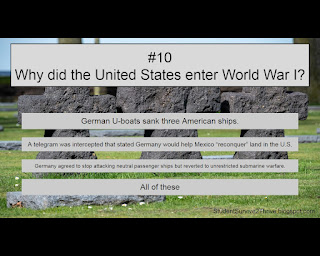
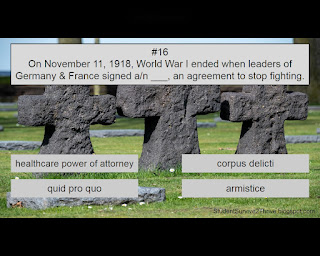
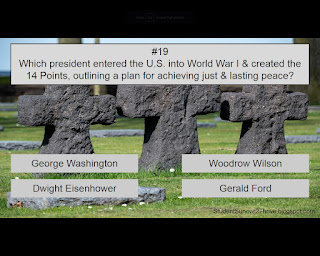
No comments:
Post a Comment
Thanks for reading my article and sending your comment! Please note that I do not place links to other web sites on this blog.
Note: Only a member of this blog may post a comment.